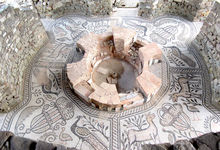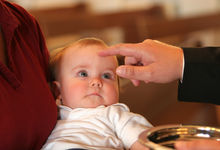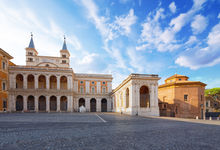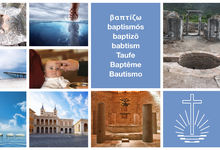The sacraments (16): the road into the baptismal community
Acknowledging the baptisms of other denominations is not as simple as it sounds, and the journey there has had its ups and downs in church history. A number of things had to be set into motion before the New Apostolic Church was in a position to acknowledge the baptisms of other Christian denominations.

“Holy Baptism with water is the first and fundamental act of grace of the triune God bestowed upon a human being who believes in Jesus Christ,” we read in chapter 8.1 of the Catechism of the New Apostolic Church (CNAC). This sounds rather self-explanatory at first blush, especially considering that baptism with water is the first sacrament of the church, the sacrament of initiation, as it were. It is what makes a human being into a Christian.
Looking back into history, however, it becomes clear that both scholars and clergy have been arguing about even this simple question for centuries: which baptism is meant? How is it celebrated? Who is permitted to dispense it? To whom can it be dispensed? And what exactly is the effect of baptism on the baptised?
Baptism as a denominational profession
Questions upon questions—which were answered differently depending on the time period and denomination in which they were asked. And the New Apostolic Church was no exception. Even in its history there were differing accents on its understanding of the sacrament. This is particularly understandable since Holy Scripture does not provide an exhaustive picture of the sacraments in general, nor of baptism with water in particular. The Bible is simply not a recipe book—it is the foundation of church doctrine, but it is denominationally interpreted.
The New Testament provides many statements concerning baptism, however, no uniform conception—let alone doctrine—of baptism can be derived from them. The baptismal understanding of any church is thus always based on the Bible, but is marked by the respective denomination. So it is also in the New Apostolic Church.
At a distance: validation still required
A teaching manual from 1916 poses the question: “Is a baptism received in another denomination valid in the New Apostolic Church?” The answer: “Yes. If the act was performed in the name of the triune God with water and words spoken in faith, it is recognised and confirmed by the covenantal intermediary authorised by God and Christ—the Apostle—at Holy Sealing.” The baptism with water was thus valid, but only publicly recognised before Holy Sealing.
In the Questions and Answers of 1952, question 267 reflects on the value of baptism: “What is the value of a baptism effected by other denominations?” The unmistakable answer is as follows: “It has no greater value than emergency baptism before its confirmation. Therefore, since the act was incomplete, the covenant with God could not be made.” It was described as incomplete because it could only produce the rebirth in combination with Holy Sealing. At that time, the New Apostolic Church clearly distanced itself from the ecumenical churches.
A rethinking process begins
After some tumultuous years and discussions, a gradual rethinking process was reflected in the Questions and Answers edition of 1992. In this publication, question 202 and its corresponding answer ran as follows: “What is the value of a baptism effected by other Christian denominations?” The baptism with water received in another Christian community or church in the name of the triune God is recognised by the New Apostolic Church as a valid sacrament. Confirmation of this baptism by the Apostle or a minister authorised by him is a prerequisite to attaining the rebirth with water and the Spirit.”
Recognising sacraments as valid within the respective denominations—this is a practice with which other churches are also familiar in their histories. But any church that wants to become involved in an ecumenical capacity cannot write things like that, because “valid there” still means “not valid here”. The New Apostolic Church’s leadership was thus compelled to give this matter further thought at the beginning of the 2000s. Project Groups and District Apostle Meetings began to occupy themselves increasingly with theological questions such as their understanding of the sacraments, church, and ministry.
A breakthrough at Uster
An information evening on 24 January 2006, which took place in the congregation of Uster, Switzerland, ushered in a new view of the understanding of baptism. At the time, the official website described it as follows: “Such a thing has never happened within the New Apostolic Church before: new definitions and clarifications of the previous doctrine were imparted worldwide with the help of a presentation by the leader of the international Church, Chief Apostle Wilhelm Leber.”
The content of this exhaustive teaching session focused on the revised doctrinal understanding of baptism as well as on questions concerning the exclusivity of the New Apostolic Church. Baptisms duly performed in other Christian churches have since been recognised without any further confirmation formulas, and the contents of the doctrinal papers published at the time have been incorporated into the Catechism.
Baptism valid for the church as a whole
Today the Catechism’s question 493—“Are baptisms performed in other Christian denominations valid?—is answered as follows: “Yes, the dispensation of Holy Baptism with water is possible and effective in all parts of the one church of Christ. Baptism with water is the first step on the way to perfect redemption. Wherever believers are baptised with water and in the name of God, the Father, the Son, and the Holy Spirit, the baptism is valid. Baptism with water has been entrusted to the church as a whole. The reason for this lies in God’s universal will to save.”
The same applies in both directions: just as the New Apostolic Church acknowledges the duly performed baptisms of other churches, the other churches likewise accept the baptism with water performed in the New Apostolic Church.
Photo: PhotoSG - stock.adobe.com
Article info
Author:
Date:
Keywords:
Peter Johanning
17.08.2020
sacraments,
Holy Baptism,
Denominations















